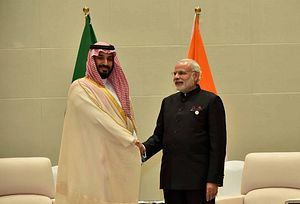Last week, in the midst of India-Pakistan tensions which show few signs of ebbing, Saudi Arabia’s Crown Prince Mohammed bin Salman, popularly known as MBS, kicked off a pre-planned regional trip that included stops in India, Pakistan, and China. Though the coincidence in timing was accidental, his voyage nonetheless spotlighted the Saudi factor in India-Pakistan relations.
In a reflection of how sensitive MBS’s trip was, he paid a trip to Pakistan but then, in order to “de-hyphenate” the visit, he returned to Saudi Arabia and traveled back to the region a second time for the India visit before moving on to China. That spotlighted the effort Saudi Arabia continues to make to not unnecessarily alienate either New Delhi or Islamabad.
More substantively, in terms of the legs of the visit, the Pakistan trip produced little for India to cheer about. The two sides expressed appreciation for efforts made by them in the “war on terrorism” despite Islamabad’s complicity with some terror groups, and there was a reference in the joint statement to “avoiding politicization of UN listing regime” although Saudi Foreign Minister Adel Al-Jubeir has come out clarifying that this was not a reference to Masood Azhar, the head of the Jaish-e-Muhammad (the terrorist group that has claimed responsibility for the Pulwama terror attack) that India had been trying to put under this list. In an indication of continued Saudi Arabia-Pakistan ties, the two countries signed deals worth $20 billion which comes in addition to $6 billion loan that Riyadh had given to Islamabad in October 2018, with Saudi Arabia also planning to invest $10 billion in a refinery and petrochemical complex in Gwadar.
The India part of the trip was also hardly a win for New Delhi. MBS’s visit to India, which came nearly three years after Modi’s visit to Saudi Arabia when leaders from both countries took a decision to diversify and expand their relationship to include trade, investment and counterterrorism, came under greater scrutiny this time around. For instance, at a more symbolic level, Modi has come under sharp criticism domestically for breaking with protocol and doing his usual bear hug with the Saudi Crown Prince. On a more substantive note, there has also been criticism that Modi did not use the occasion to extract some strong commitment from Saudi Arabia on Pakistan and terrorism. Though he had said that there will be strong reference to countering terrorism, the fact that MBS did not mention Pulwama is seen in India as a big failure.
Of course, the expectation that India could extract certain concessions from Saudi Arabia may seem far-fetched because a leader of the Islamic world like Saudi Arabia will always be in a tight spot in managing relations with both secular India and Islamic Pakistan. There was also a clear effort to forge greater cooperation. As a senior Indian official TS Tirumurti emphasized, for Saudi Arabia, India is one of the eight strategic partners and Riyadh plans to “deepen partnership” with India in the areas of security, trade, investment and culture. During the visit, MBS committed to invest $100 billion over the next few years in areas like energy, refining, petrochemicals, infrastructure, agriculture, and manufacturing, and the two sides also plan to deepen the bilateral defence and security engagements, with a special focus on joint naval exercises between the two militaries.
In sum, New Delhi should be happy with Saudi promises of trade and investment. But from the perspective of the fight against terror or on Indian objective of “isolating Pakistan,” it will be seen rather disappointing. For Saudi Arabia, Pakistan offers important security benefits, including a potential nuclear cover, which India simply cannot match.
After finishing his India visit, the crown prince traveled to China. China is important to Riyadh on its own terms – it is its largest trading partner and MBS sees an opportunity to further his Vision 2030 plan. But the focus was also on what if any additional cooperation both sides would forge during the visit, given that Saudi Arabia is one of Pakistan’s strongest friends and strategic partners.
On this part of the voyage, there were few surprises for India. The trip saw China and Saudi Arabia forge greater economic ties and also reinforce their shared cooperation on counterterrorism, with the international headlines focused on how Riyadh, the center of the Muslim world, seemed to basically sweep aside China’s poor treatment of its own Muslim Uyghurs. There were also references made to China’s interest in Saudi Arabia in terms of its grander designs with respect to the Belt and Road Initiative and the Maritime Silk Road, as a lot of the Chinese trade will go through the Red Sea, bordering Saudi Arabia.
All in all, unfortunately for New Delhi, if anything this leg, as with MBS’s trip more generally, amounted to largely more of the same in terms of both the concerns India has long had and the limits to further altering the Saudi Arabia variable in the India-Pakistan relationship to its advantage.

































